OMED 1179 - Community Care: Care Practice for Learning Disability
VerifiedAdded on 2023/04/21
|10
|3263
|140
Essay
AI Summary
This essay analyzes care practices in the community for individuals with learning disabilities in the UK, highlighting minimum care standards, relevant policies like the Care Act 2014 and NHSCCA (1990), and the importance of person-centered care. It discusses the principles of community care, emphasizing the roles of organizations like ADASS and CQC in empowering individuals and families. The essay also examines the roles of formal carers (nurses) in conducting needs assessments and developing care plans, and informal carers (family members) in providing support, while addressing compassion fatigue. The conclusion emphasizes the need for community-based initiatives to promote the health and well-being of people with learning disabilities.
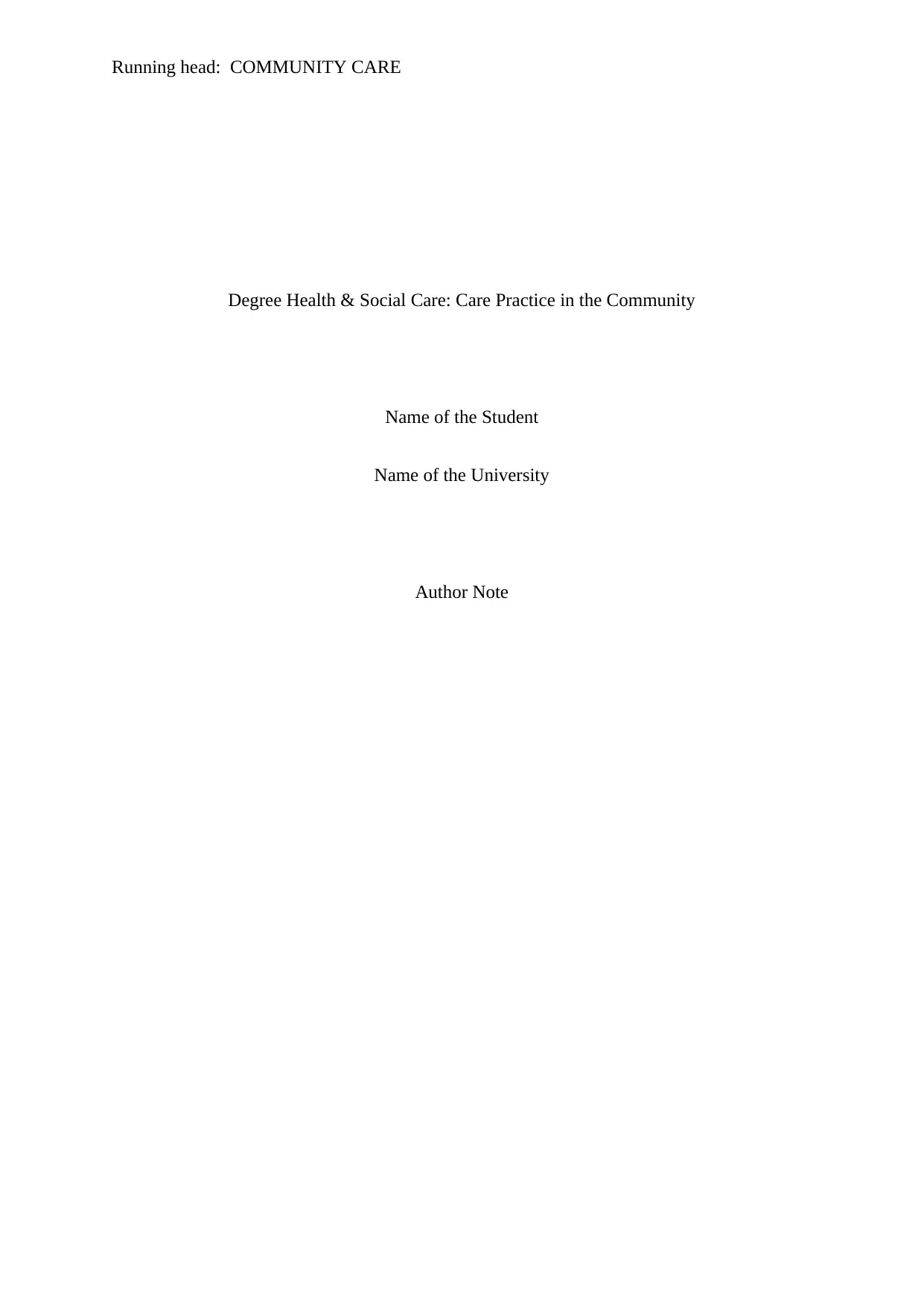
Running head: COMMUNITY CARE
Degree Health & Social Care: Care Practice in the Community
Name of the Student
Name of the University
Author Note
Degree Health & Social Care: Care Practice in the Community
Name of the Student
Name of the University
Author Note
Paraphrase This Document
Need a fresh take? Get an instant paraphrase of this document with our AI Paraphraser
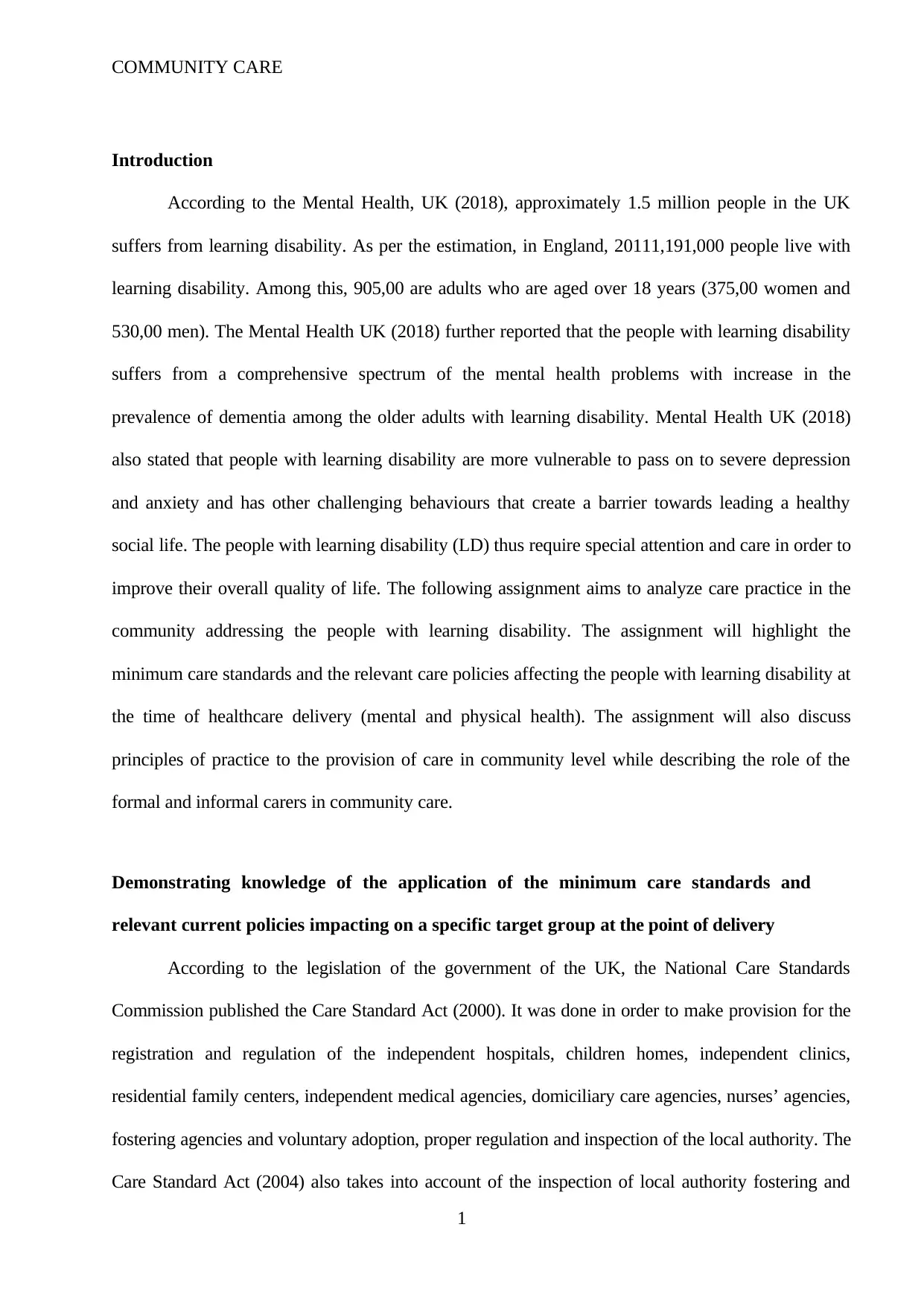
COMMUNITY CARE
Introduction
According to the Mental Health, UK (2018), approximately 1.5 million people in the UK
suffers from learning disability. As per the estimation, in England, 20111,191,000 people live with
learning disability. Among this, 905,00 are adults who are aged over 18 years (375,00 women and
530,00 men). The Mental Health UK (2018) further reported that the people with learning disability
suffers from a comprehensive spectrum of the mental health problems with increase in the
prevalence of dementia among the older adults with learning disability. Mental Health UK (2018)
also stated that people with learning disability are more vulnerable to pass on to severe depression
and anxiety and has other challenging behaviours that create a barrier towards leading a healthy
social life. The people with learning disability (LD) thus require special attention and care in order to
improve their overall quality of life. The following assignment aims to analyze care practice in the
community addressing the people with learning disability. The assignment will highlight the
minimum care standards and the relevant care policies affecting the people with learning disability at
the time of healthcare delivery (mental and physical health). The assignment will also discuss
principles of practice to the provision of care in community level while describing the role of the
formal and informal carers in community care.
Demonstrating knowledge of the application of the minimum care standards and
relevant current policies impacting on a specific target group at the point of delivery
According to the legislation of the government of the UK, the National Care Standards
Commission published the Care Standard Act (2000). It was done in order to make provision for the
registration and regulation of the independent hospitals, children homes, independent clinics,
residential family centers, independent medical agencies, domiciliary care agencies, nurses’ agencies,
fostering agencies and voluntary adoption, proper regulation and inspection of the local authority. The
Care Standard Act (2004) also takes into account of the inspection of local authority fostering and
1
Introduction
According to the Mental Health, UK (2018), approximately 1.5 million people in the UK
suffers from learning disability. As per the estimation, in England, 20111,191,000 people live with
learning disability. Among this, 905,00 are adults who are aged over 18 years (375,00 women and
530,00 men). The Mental Health UK (2018) further reported that the people with learning disability
suffers from a comprehensive spectrum of the mental health problems with increase in the
prevalence of dementia among the older adults with learning disability. Mental Health UK (2018)
also stated that people with learning disability are more vulnerable to pass on to severe depression
and anxiety and has other challenging behaviours that create a barrier towards leading a healthy
social life. The people with learning disability (LD) thus require special attention and care in order to
improve their overall quality of life. The following assignment aims to analyze care practice in the
community addressing the people with learning disability. The assignment will highlight the
minimum care standards and the relevant care policies affecting the people with learning disability at
the time of healthcare delivery (mental and physical health). The assignment will also discuss
principles of practice to the provision of care in community level while describing the role of the
formal and informal carers in community care.
Demonstrating knowledge of the application of the minimum care standards and
relevant current policies impacting on a specific target group at the point of delivery
According to the legislation of the government of the UK, the National Care Standards
Commission published the Care Standard Act (2000). It was done in order to make provision for the
registration and regulation of the independent hospitals, children homes, independent clinics,
residential family centers, independent medical agencies, domiciliary care agencies, nurses’ agencies,
fostering agencies and voluntary adoption, proper regulation and inspection of the local authority. The
Care Standard Act (2004) also takes into account of the inspection of local authority fostering and
1
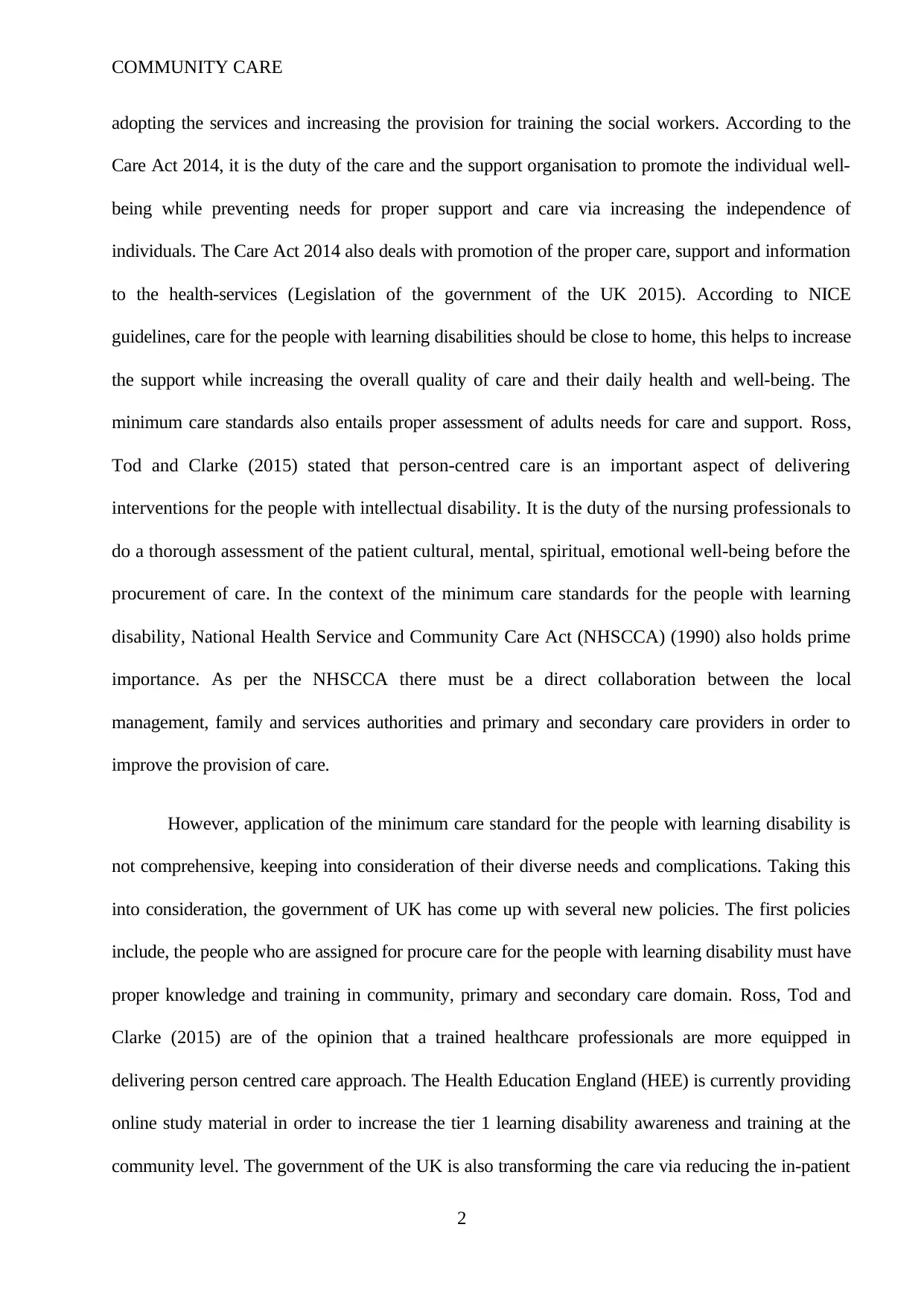
COMMUNITY CARE
adopting the services and increasing the provision for training the social workers. According to the
Care Act 2014, it is the duty of the care and the support organisation to promote the individual well-
being while preventing needs for proper support and care via increasing the independence of
individuals. The Care Act 2014 also deals with promotion of the proper care, support and information
to the health-services (Legislation of the government of the UK 2015). According to NICE
guidelines, care for the people with learning disabilities should be close to home, this helps to increase
the support while increasing the overall quality of care and their daily health and well-being. The
minimum care standards also entails proper assessment of adults needs for care and support. Ross,
Tod and Clarke (2015) stated that person-centred care is an important aspect of delivering
interventions for the people with intellectual disability. It is the duty of the nursing professionals to
do a thorough assessment of the patient cultural, mental, spiritual, emotional well-being before the
procurement of care. In the context of the minimum care standards for the people with learning
disability, National Health Service and Community Care Act (NHSCCA) (1990) also holds prime
importance. As per the NHSCCA there must be a direct collaboration between the local
management, family and services authorities and primary and secondary care providers in order to
improve the provision of care.
However, application of the minimum care standard for the people with learning disability is
not comprehensive, keeping into consideration of their diverse needs and complications. Taking this
into consideration, the government of UK has come up with several new policies. The first policies
include, the people who are assigned for procure care for the people with learning disability must have
proper knowledge and training in community, primary and secondary care domain. Ross, Tod and
Clarke (2015) are of the opinion that a trained healthcare professionals are more equipped in
delivering person centred care approach. The Health Education England (HEE) is currently providing
online study material in order to increase the tier 1 learning disability awareness and training at the
community level. The government of the UK is also transforming the care via reducing the in-patient
2
adopting the services and increasing the provision for training the social workers. According to the
Care Act 2014, it is the duty of the care and the support organisation to promote the individual well-
being while preventing needs for proper support and care via increasing the independence of
individuals. The Care Act 2014 also deals with promotion of the proper care, support and information
to the health-services (Legislation of the government of the UK 2015). According to NICE
guidelines, care for the people with learning disabilities should be close to home, this helps to increase
the support while increasing the overall quality of care and their daily health and well-being. The
minimum care standards also entails proper assessment of adults needs for care and support. Ross,
Tod and Clarke (2015) stated that person-centred care is an important aspect of delivering
interventions for the people with intellectual disability. It is the duty of the nursing professionals to
do a thorough assessment of the patient cultural, mental, spiritual, emotional well-being before the
procurement of care. In the context of the minimum care standards for the people with learning
disability, National Health Service and Community Care Act (NHSCCA) (1990) also holds prime
importance. As per the NHSCCA there must be a direct collaboration between the local
management, family and services authorities and primary and secondary care providers in order to
improve the provision of care.
However, application of the minimum care standard for the people with learning disability is
not comprehensive, keeping into consideration of their diverse needs and complications. Taking this
into consideration, the government of UK has come up with several new policies. The first policies
include, the people who are assigned for procure care for the people with learning disability must have
proper knowledge and training in community, primary and secondary care domain. Ross, Tod and
Clarke (2015) are of the opinion that a trained healthcare professionals are more equipped in
delivering person centred care approach. The Health Education England (HEE) is currently providing
online study material in order to increase the tier 1 learning disability awareness and training at the
community level. The government of the UK is also transforming the care via reducing the in-patient
2
⊘ This is a preview!⊘
Do you want full access?
Subscribe today to unlock all pages.

Trusted by 1+ million students worldwide
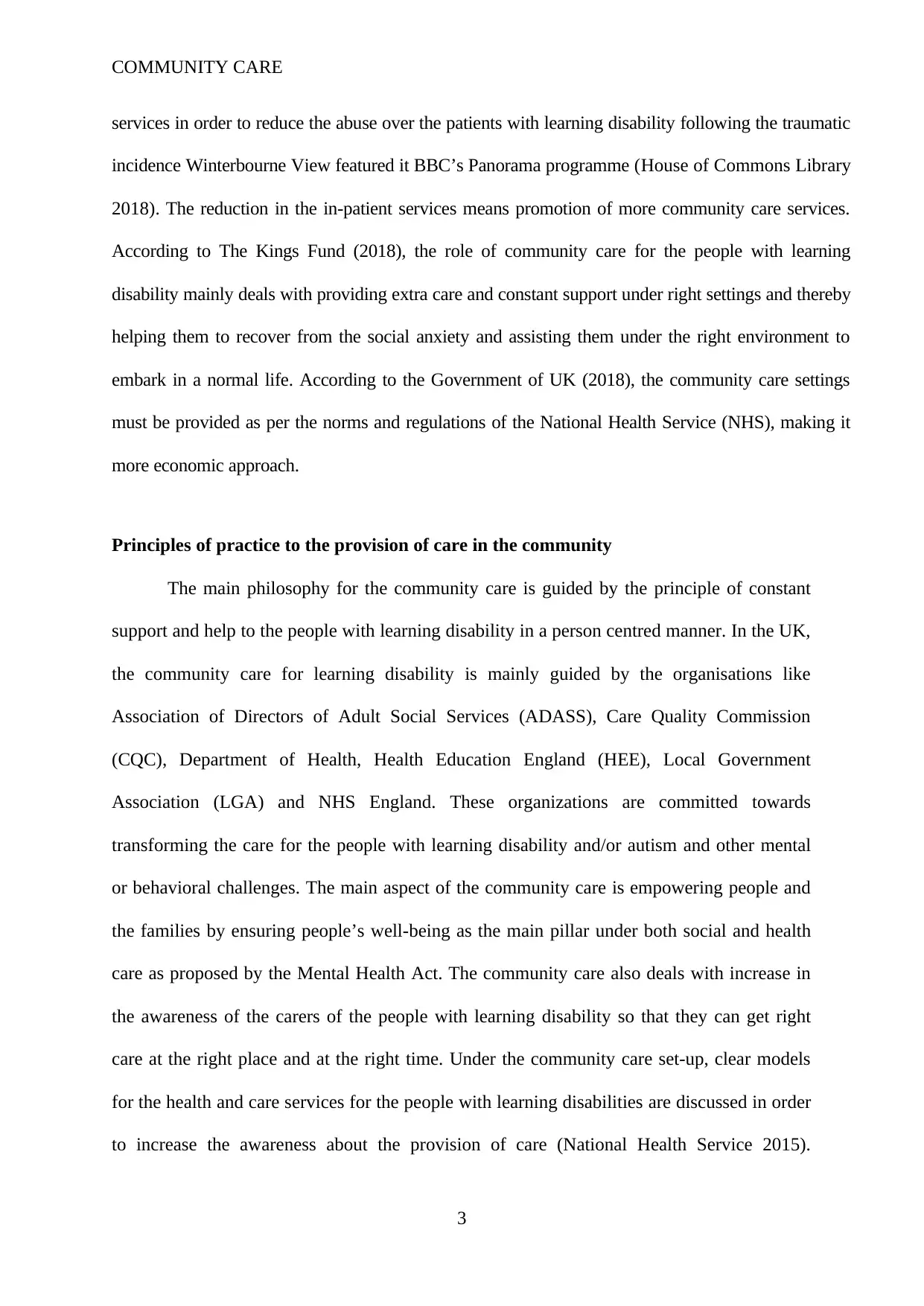
COMMUNITY CARE
services in order to reduce the abuse over the patients with learning disability following the traumatic
incidence Winterbourne View featured it BBC’s Panorama programme (House of Commons Library
2018). The reduction in the in-patient services means promotion of more community care services.
According to The Kings Fund (2018), the role of community care for the people with learning
disability mainly deals with providing extra care and constant support under right settings and thereby
helping them to recover from the social anxiety and assisting them under the right environment to
embark in a normal life. According to the Government of UK (2018), the community care settings
must be provided as per the norms and regulations of the National Health Service (NHS), making it
more economic approach.
Principles of practice to the provision of care in the community
The main philosophy for the community care is guided by the principle of constant
support and help to the people with learning disability in a person centred manner. In the UK,
the community care for learning disability is mainly guided by the organisations like
Association of Directors of Adult Social Services (ADASS), Care Quality Commission
(CQC), Department of Health, Health Education England (HEE), Local Government
Association (LGA) and NHS England. These organizations are committed towards
transforming the care for the people with learning disability and/or autism and other mental
or behavioral challenges. The main aspect of the community care is empowering people and
the families by ensuring people’s well-being as the main pillar under both social and health
care as proposed by the Mental Health Act. The community care also deals with increase in
the awareness of the carers of the people with learning disability so that they can get right
care at the right place and at the right time. Under the community care set-up, clear models
for the health and care services for the people with learning disabilities are discussed in order
to increase the awareness about the provision of care (National Health Service 2015).
3
services in order to reduce the abuse over the patients with learning disability following the traumatic
incidence Winterbourne View featured it BBC’s Panorama programme (House of Commons Library
2018). The reduction in the in-patient services means promotion of more community care services.
According to The Kings Fund (2018), the role of community care for the people with learning
disability mainly deals with providing extra care and constant support under right settings and thereby
helping them to recover from the social anxiety and assisting them under the right environment to
embark in a normal life. According to the Government of UK (2018), the community care settings
must be provided as per the norms and regulations of the National Health Service (NHS), making it
more economic approach.
Principles of practice to the provision of care in the community
The main philosophy for the community care is guided by the principle of constant
support and help to the people with learning disability in a person centred manner. In the UK,
the community care for learning disability is mainly guided by the organisations like
Association of Directors of Adult Social Services (ADASS), Care Quality Commission
(CQC), Department of Health, Health Education England (HEE), Local Government
Association (LGA) and NHS England. These organizations are committed towards
transforming the care for the people with learning disability and/or autism and other mental
or behavioral challenges. The main aspect of the community care is empowering people and
the families by ensuring people’s well-being as the main pillar under both social and health
care as proposed by the Mental Health Act. The community care also deals with increase in
the awareness of the carers of the people with learning disability so that they can get right
care at the right place and at the right time. Under the community care set-up, clear models
for the health and care services for the people with learning disabilities are discussed in order
to increase the awareness about the provision of care (National Health Service 2015).
3
Paraphrase This Document
Need a fresh take? Get an instant paraphrase of this document with our AI Paraphraser
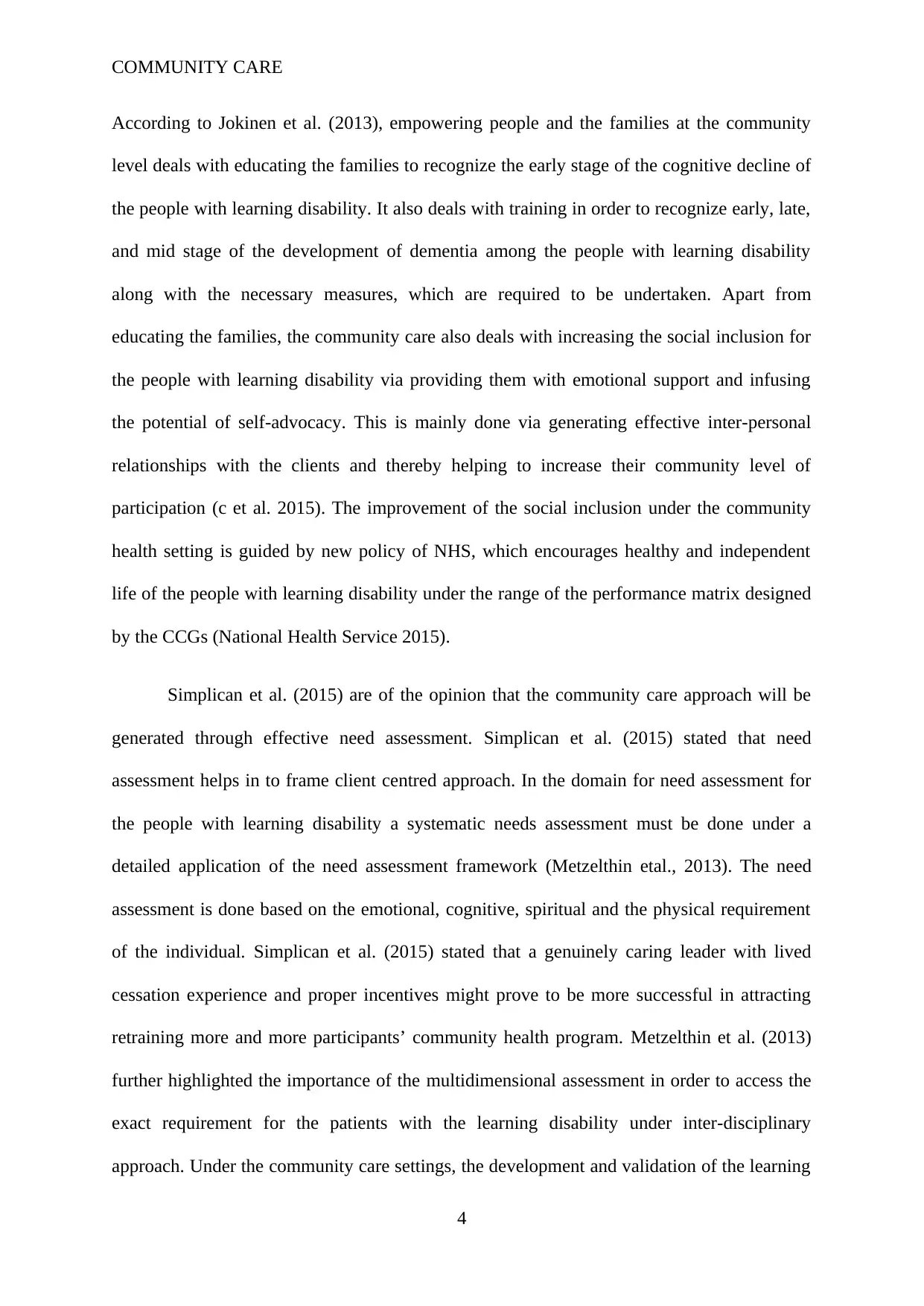
COMMUNITY CARE
According to Jokinen et al. (2013), empowering people and the families at the community
level deals with educating the families to recognize the early stage of the cognitive decline of
the people with learning disability. It also deals with training in order to recognize early, late,
and mid stage of the development of dementia among the people with learning disability
along with the necessary measures, which are required to be undertaken. Apart from
educating the families, the community care also deals with increasing the social inclusion for
the people with learning disability via providing them with emotional support and infusing
the potential of self-advocacy. This is mainly done via generating effective inter-personal
relationships with the clients and thereby helping to increase their community level of
participation (c et al. 2015). The improvement of the social inclusion under the community
health setting is guided by new policy of NHS, which encourages healthy and independent
life of the people with learning disability under the range of the performance matrix designed
by the CCGs (National Health Service 2015).
Simplican et al. (2015) are of the opinion that the community care approach will be
generated through effective need assessment. Simplican et al. (2015) stated that need
assessment helps in to frame client centred approach. In the domain for need assessment for
the people with learning disability a systematic needs assessment must be done under a
detailed application of the need assessment framework (Metzelthin etal., 2013). The need
assessment is done based on the emotional, cognitive, spiritual and the physical requirement
of the individual. Simplican et al. (2015) stated that a genuinely caring leader with lived
cessation experience and proper incentives might prove to be more successful in attracting
retraining more and more participants’ community health program. Metzelthin et al. (2013)
further highlighted the importance of the multidimensional assessment in order to access the
exact requirement for the patients with the learning disability under inter-disciplinary
approach. Under the community care settings, the development and validation of the learning
4
According to Jokinen et al. (2013), empowering people and the families at the community
level deals with educating the families to recognize the early stage of the cognitive decline of
the people with learning disability. It also deals with training in order to recognize early, late,
and mid stage of the development of dementia among the people with learning disability
along with the necessary measures, which are required to be undertaken. Apart from
educating the families, the community care also deals with increasing the social inclusion for
the people with learning disability via providing them with emotional support and infusing
the potential of self-advocacy. This is mainly done via generating effective inter-personal
relationships with the clients and thereby helping to increase their community level of
participation (c et al. 2015). The improvement of the social inclusion under the community
health setting is guided by new policy of NHS, which encourages healthy and independent
life of the people with learning disability under the range of the performance matrix designed
by the CCGs (National Health Service 2015).
Simplican et al. (2015) are of the opinion that the community care approach will be
generated through effective need assessment. Simplican et al. (2015) stated that need
assessment helps in to frame client centred approach. In the domain for need assessment for
the people with learning disability a systematic needs assessment must be done under a
detailed application of the need assessment framework (Metzelthin etal., 2013). The need
assessment is done based on the emotional, cognitive, spiritual and the physical requirement
of the individual. Simplican et al. (2015) stated that a genuinely caring leader with lived
cessation experience and proper incentives might prove to be more successful in attracting
retraining more and more participants’ community health program. Metzelthin et al. (2013)
further highlighted the importance of the multidimensional assessment in order to access the
exact requirement for the patients with the learning disability under inter-disciplinary
approach. Under the community care settings, the development and validation of the learning
4
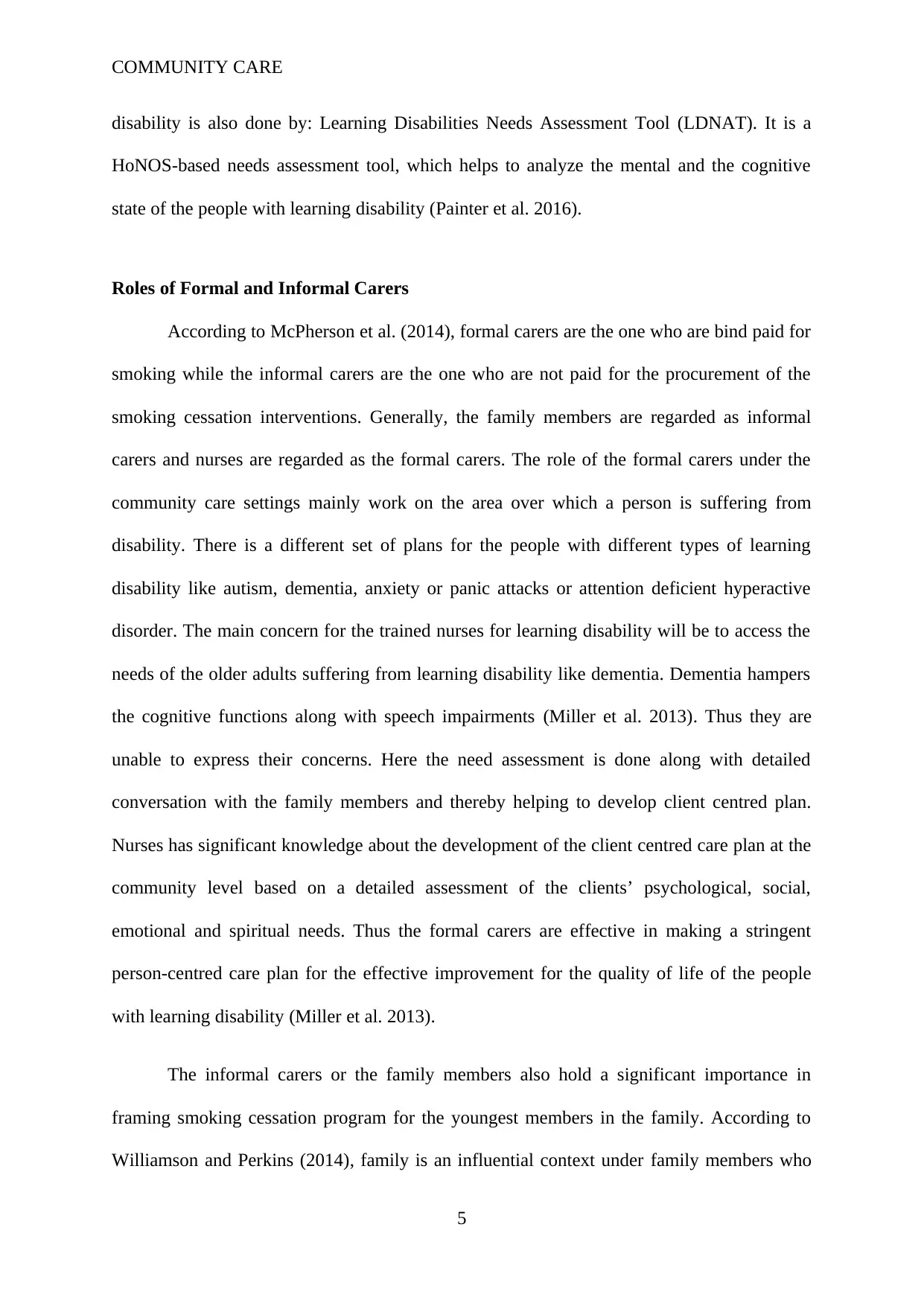
COMMUNITY CARE
disability is also done by: Learning Disabilities Needs Assessment Tool (LDNAT). It is a
HoNOS-based needs assessment tool, which helps to analyze the mental and the cognitive
state of the people with learning disability (Painter et al. 2016).
Roles of Formal and Informal Carers
According to McPherson et al. (2014), formal carers are the one who are bind paid for
smoking while the informal carers are the one who are not paid for the procurement of the
smoking cessation interventions. Generally, the family members are regarded as informal
carers and nurses are regarded as the formal carers. The role of the formal carers under the
community care settings mainly work on the area over which a person is suffering from
disability. There is a different set of plans for the people with different types of learning
disability like autism, dementia, anxiety or panic attacks or attention deficient hyperactive
disorder. The main concern for the trained nurses for learning disability will be to access the
needs of the older adults suffering from learning disability like dementia. Dementia hampers
the cognitive functions along with speech impairments (Miller et al. 2013). Thus they are
unable to express their concerns. Here the need assessment is done along with detailed
conversation with the family members and thereby helping to develop client centred plan.
Nurses has significant knowledge about the development of the client centred care plan at the
community level based on a detailed assessment of the clients’ psychological, social,
emotional and spiritual needs. Thus the formal carers are effective in making a stringent
person-centred care plan for the effective improvement for the quality of life of the people
with learning disability (Miller et al. 2013).
The informal carers or the family members also hold a significant importance in
framing smoking cessation program for the youngest members in the family. According to
Williamson and Perkins (2014), family is an influential context under family members who
5
disability is also done by: Learning Disabilities Needs Assessment Tool (LDNAT). It is a
HoNOS-based needs assessment tool, which helps to analyze the mental and the cognitive
state of the people with learning disability (Painter et al. 2016).
Roles of Formal and Informal Carers
According to McPherson et al. (2014), formal carers are the one who are bind paid for
smoking while the informal carers are the one who are not paid for the procurement of the
smoking cessation interventions. Generally, the family members are regarded as informal
carers and nurses are regarded as the formal carers. The role of the formal carers under the
community care settings mainly work on the area over which a person is suffering from
disability. There is a different set of plans for the people with different types of learning
disability like autism, dementia, anxiety or panic attacks or attention deficient hyperactive
disorder. The main concern for the trained nurses for learning disability will be to access the
needs of the older adults suffering from learning disability like dementia. Dementia hampers
the cognitive functions along with speech impairments (Miller et al. 2013). Thus they are
unable to express their concerns. Here the need assessment is done along with detailed
conversation with the family members and thereby helping to develop client centred plan.
Nurses has significant knowledge about the development of the client centred care plan at the
community level based on a detailed assessment of the clients’ psychological, social,
emotional and spiritual needs. Thus the formal carers are effective in making a stringent
person-centred care plan for the effective improvement for the quality of life of the people
with learning disability (Miller et al. 2013).
The informal carers or the family members also hold a significant importance in
framing smoking cessation program for the youngest members in the family. According to
Williamson and Perkins (2014), family is an influential context under family members who
5
⊘ This is a preview!⊘
Do you want full access?
Subscribe today to unlock all pages.

Trusted by 1+ million students worldwide
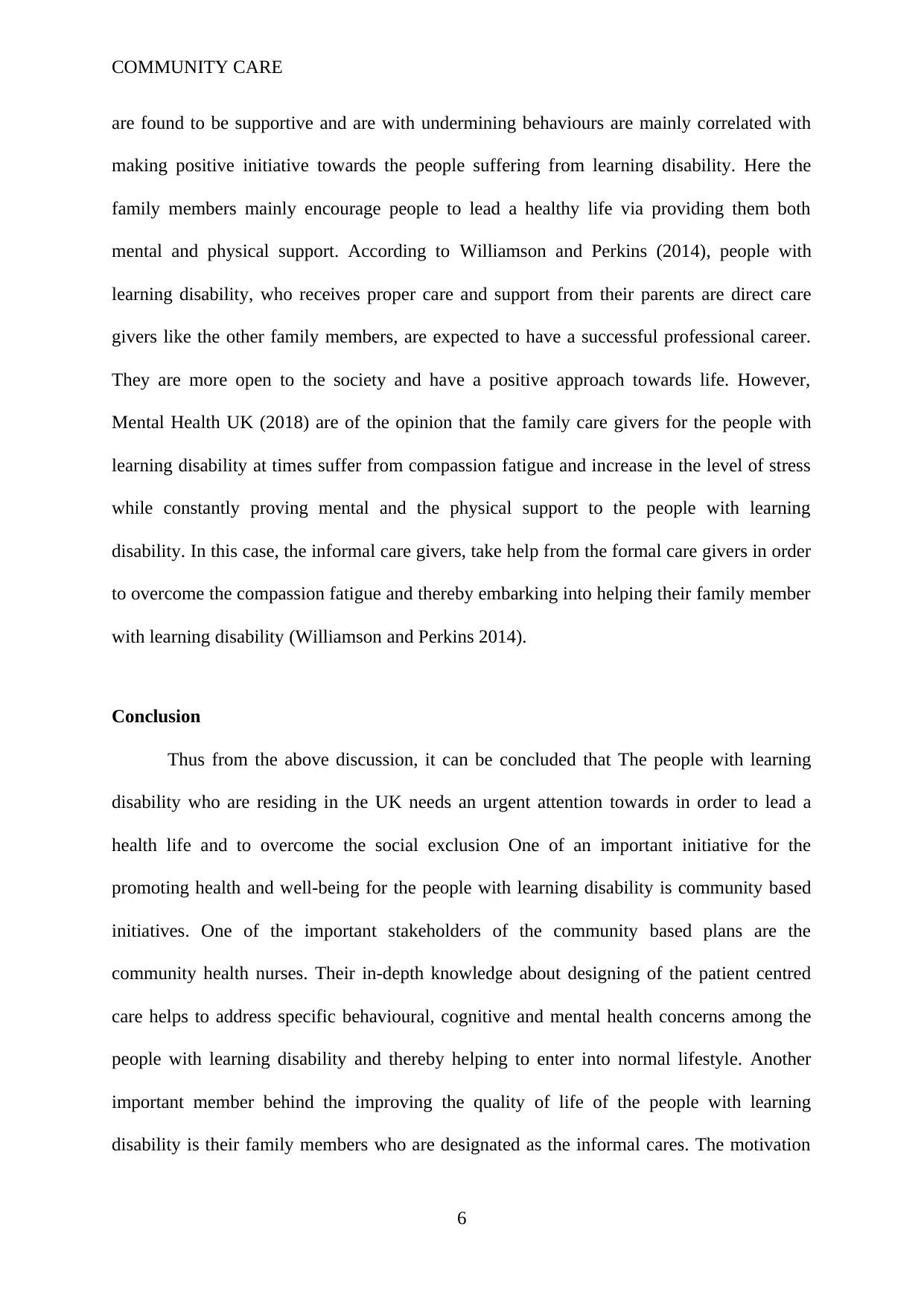
COMMUNITY CARE
are found to be supportive and are with undermining behaviours are mainly correlated with
making positive initiative towards the people suffering from learning disability. Here the
family members mainly encourage people to lead a healthy life via providing them both
mental and physical support. According to Williamson and Perkins (2014), people with
learning disability, who receives proper care and support from their parents are direct care
givers like the other family members, are expected to have a successful professional career.
They are more open to the society and have a positive approach towards life. However,
Mental Health UK (2018) are of the opinion that the family care givers for the people with
learning disability at times suffer from compassion fatigue and increase in the level of stress
while constantly proving mental and the physical support to the people with learning
disability. In this case, the informal care givers, take help from the formal care givers in order
to overcome the compassion fatigue and thereby embarking into helping their family member
with learning disability (Williamson and Perkins 2014).
Conclusion
Thus from the above discussion, it can be concluded that The people with learning
disability who are residing in the UK needs an urgent attention towards in order to lead a
health life and to overcome the social exclusion One of an important initiative for the
promoting health and well-being for the people with learning disability is community based
initiatives. One of the important stakeholders of the community based plans are the
community health nurses. Their in-depth knowledge about designing of the patient centred
care helps to address specific behavioural, cognitive and mental health concerns among the
people with learning disability and thereby helping to enter into normal lifestyle. Another
important member behind the improving the quality of life of the people with learning
disability is their family members who are designated as the informal cares. The motivation
6
are found to be supportive and are with undermining behaviours are mainly correlated with
making positive initiative towards the people suffering from learning disability. Here the
family members mainly encourage people to lead a healthy life via providing them both
mental and physical support. According to Williamson and Perkins (2014), people with
learning disability, who receives proper care and support from their parents are direct care
givers like the other family members, are expected to have a successful professional career.
They are more open to the society and have a positive approach towards life. However,
Mental Health UK (2018) are of the opinion that the family care givers for the people with
learning disability at times suffer from compassion fatigue and increase in the level of stress
while constantly proving mental and the physical support to the people with learning
disability. In this case, the informal care givers, take help from the formal care givers in order
to overcome the compassion fatigue and thereby embarking into helping their family member
with learning disability (Williamson and Perkins 2014).
Conclusion
Thus from the above discussion, it can be concluded that The people with learning
disability who are residing in the UK needs an urgent attention towards in order to lead a
health life and to overcome the social exclusion One of an important initiative for the
promoting health and well-being for the people with learning disability is community based
initiatives. One of the important stakeholders of the community based plans are the
community health nurses. Their in-depth knowledge about designing of the patient centred
care helps to address specific behavioural, cognitive and mental health concerns among the
people with learning disability and thereby helping to enter into normal lifestyle. Another
important member behind the improving the quality of life of the people with learning
disability is their family members who are designated as the informal cares. The motivation
6
Paraphrase This Document
Need a fresh take? Get an instant paraphrase of this document with our AI Paraphraser
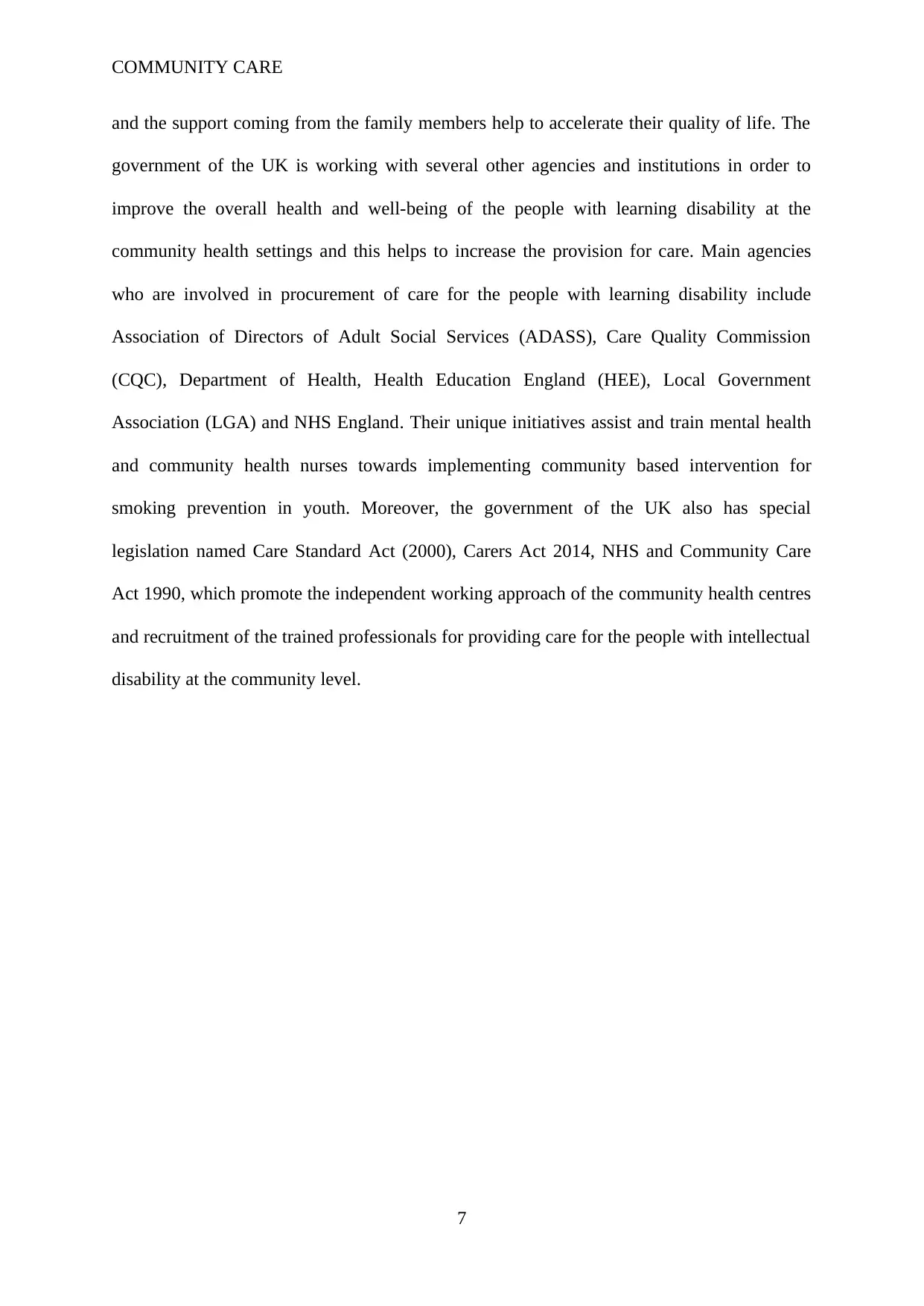
COMMUNITY CARE
and the support coming from the family members help to accelerate their quality of life. The
government of the UK is working with several other agencies and institutions in order to
improve the overall health and well-being of the people with learning disability at the
community health settings and this helps to increase the provision for care. Main agencies
who are involved in procurement of care for the people with learning disability include
Association of Directors of Adult Social Services (ADASS), Care Quality Commission
(CQC), Department of Health, Health Education England (HEE), Local Government
Association (LGA) and NHS England. Their unique initiatives assist and train mental health
and community health nurses towards implementing community based intervention for
smoking prevention in youth. Moreover, the government of the UK also has special
legislation named Care Standard Act (2000), Carers Act 2014, NHS and Community Care
Act 1990, which promote the independent working approach of the community health centres
and recruitment of the trained professionals for providing care for the people with intellectual
disability at the community level.
7
and the support coming from the family members help to accelerate their quality of life. The
government of the UK is working with several other agencies and institutions in order to
improve the overall health and well-being of the people with learning disability at the
community health settings and this helps to increase the provision for care. Main agencies
who are involved in procurement of care for the people with learning disability include
Association of Directors of Adult Social Services (ADASS), Care Quality Commission
(CQC), Department of Health, Health Education England (HEE), Local Government
Association (LGA) and NHS England. Their unique initiatives assist and train mental health
and community health nurses towards implementing community based intervention for
smoking prevention in youth. Moreover, the government of the UK also has special
legislation named Care Standard Act (2000), Carers Act 2014, NHS and Community Care
Act 1990, which promote the independent working approach of the community health centres
and recruitment of the trained professionals for providing care for the people with intellectual
disability at the community level.
7
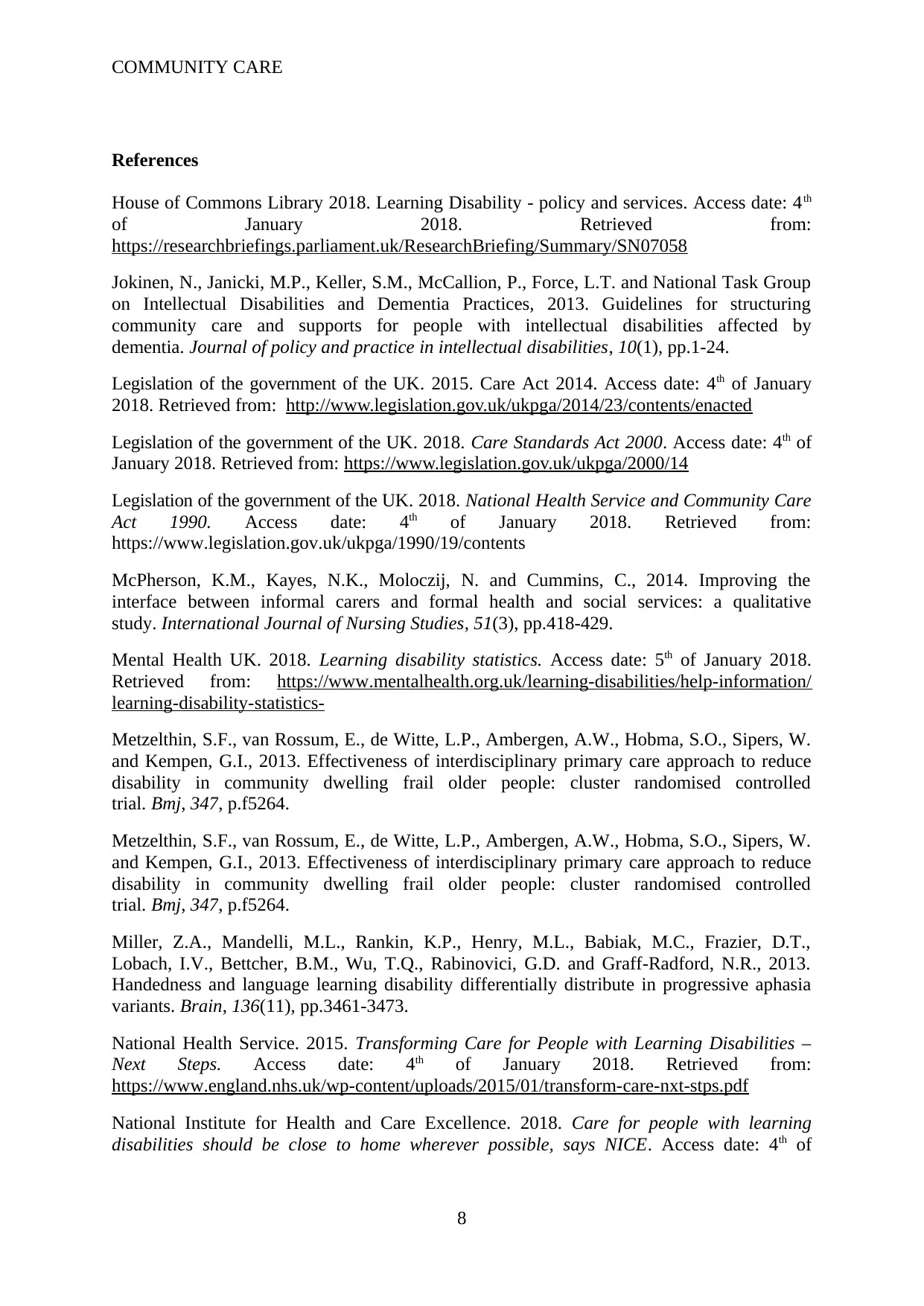
COMMUNITY CARE
References
House of Commons Library 2018. Learning Disability - policy and services. Access date: 4th
of January 2018. Retrieved from:
https://researchbriefings.parliament.uk/ResearchBriefing/Summary/SN07058
Jokinen, N., Janicki, M.P., Keller, S.M., McCallion, P., Force, L.T. and National Task Group
on Intellectual Disabilities and Dementia Practices, 2013. Guidelines for structuring
community care and supports for people with intellectual disabilities affected by
dementia. Journal of policy and practice in intellectual disabilities, 10(1), pp.1-24.
Legislation of the government of the UK. 2015. Care Act 2014. Access date: 4th of January
2018. Retrieved from: http://www.legislation.gov.uk/ukpga/2014/23/contents/enacted
Legislation of the government of the UK. 2018. Care Standards Act 2000. Access date: 4th of
January 2018. Retrieved from: https://www.legislation.gov.uk/ukpga/2000/14
Legislation of the government of the UK. 2018. National Health Service and Community Care
Act 1990. Access date: 4th of January 2018. Retrieved from:
https://www.legislation.gov.uk/ukpga/1990/19/contents
McPherson, K.M., Kayes, N.K., Moloczij, N. and Cummins, C., 2014. Improving the
interface between informal carers and formal health and social services: a qualitative
study. International Journal of Nursing Studies, 51(3), pp.418-429.
Mental Health UK. 2018. Learning disability statistics. Access date: 5th of January 2018.
Retrieved from: https://www.mentalhealth.org.uk/learning-disabilities/help-information/
learning-disability-statistics-
Metzelthin, S.F., van Rossum, E., de Witte, L.P., Ambergen, A.W., Hobma, S.O., Sipers, W.
and Kempen, G.I., 2013. Effectiveness of interdisciplinary primary care approach to reduce
disability in community dwelling frail older people: cluster randomised controlled
trial. Bmj, 347, p.f5264.
Metzelthin, S.F., van Rossum, E., de Witte, L.P., Ambergen, A.W., Hobma, S.O., Sipers, W.
and Kempen, G.I., 2013. Effectiveness of interdisciplinary primary care approach to reduce
disability in community dwelling frail older people: cluster randomised controlled
trial. Bmj, 347, p.f5264.
Miller, Z.A., Mandelli, M.L., Rankin, K.P., Henry, M.L., Babiak, M.C., Frazier, D.T.,
Lobach, I.V., Bettcher, B.M., Wu, T.Q., Rabinovici, G.D. and Graff-Radford, N.R., 2013.
Handedness and language learning disability differentially distribute in progressive aphasia
variants. Brain, 136(11), pp.3461-3473.
National Health Service. 2015. Transforming Care for People with Learning Disabilities –
Next Steps. Access date: 4th of January 2018. Retrieved from:
https://www.england.nhs.uk/wp-content/uploads/2015/01/transform-care-nxt-stps.pdf
National Institute for Health and Care Excellence. 2018. Care for people with learning
disabilities should be close to home wherever possible, says NICE. Access date: 4th of
8
References
House of Commons Library 2018. Learning Disability - policy and services. Access date: 4th
of January 2018. Retrieved from:
https://researchbriefings.parliament.uk/ResearchBriefing/Summary/SN07058
Jokinen, N., Janicki, M.P., Keller, S.M., McCallion, P., Force, L.T. and National Task Group
on Intellectual Disabilities and Dementia Practices, 2013. Guidelines for structuring
community care and supports for people with intellectual disabilities affected by
dementia. Journal of policy and practice in intellectual disabilities, 10(1), pp.1-24.
Legislation of the government of the UK. 2015. Care Act 2014. Access date: 4th of January
2018. Retrieved from: http://www.legislation.gov.uk/ukpga/2014/23/contents/enacted
Legislation of the government of the UK. 2018. Care Standards Act 2000. Access date: 4th of
January 2018. Retrieved from: https://www.legislation.gov.uk/ukpga/2000/14
Legislation of the government of the UK. 2018. National Health Service and Community Care
Act 1990. Access date: 4th of January 2018. Retrieved from:
https://www.legislation.gov.uk/ukpga/1990/19/contents
McPherson, K.M., Kayes, N.K., Moloczij, N. and Cummins, C., 2014. Improving the
interface between informal carers and formal health and social services: a qualitative
study. International Journal of Nursing Studies, 51(3), pp.418-429.
Mental Health UK. 2018. Learning disability statistics. Access date: 5th of January 2018.
Retrieved from: https://www.mentalhealth.org.uk/learning-disabilities/help-information/
learning-disability-statistics-
Metzelthin, S.F., van Rossum, E., de Witte, L.P., Ambergen, A.W., Hobma, S.O., Sipers, W.
and Kempen, G.I., 2013. Effectiveness of interdisciplinary primary care approach to reduce
disability in community dwelling frail older people: cluster randomised controlled
trial. Bmj, 347, p.f5264.
Metzelthin, S.F., van Rossum, E., de Witte, L.P., Ambergen, A.W., Hobma, S.O., Sipers, W.
and Kempen, G.I., 2013. Effectiveness of interdisciplinary primary care approach to reduce
disability in community dwelling frail older people: cluster randomised controlled
trial. Bmj, 347, p.f5264.
Miller, Z.A., Mandelli, M.L., Rankin, K.P., Henry, M.L., Babiak, M.C., Frazier, D.T.,
Lobach, I.V., Bettcher, B.M., Wu, T.Q., Rabinovici, G.D. and Graff-Radford, N.R., 2013.
Handedness and language learning disability differentially distribute in progressive aphasia
variants. Brain, 136(11), pp.3461-3473.
National Health Service. 2015. Transforming Care for People with Learning Disabilities –
Next Steps. Access date: 4th of January 2018. Retrieved from:
https://www.england.nhs.uk/wp-content/uploads/2015/01/transform-care-nxt-stps.pdf
National Institute for Health and Care Excellence. 2018. Care for people with learning
disabilities should be close to home wherever possible, says NICE. Access date: 4th of
8
⊘ This is a preview!⊘
Do you want full access?
Subscribe today to unlock all pages.

Trusted by 1+ million students worldwide
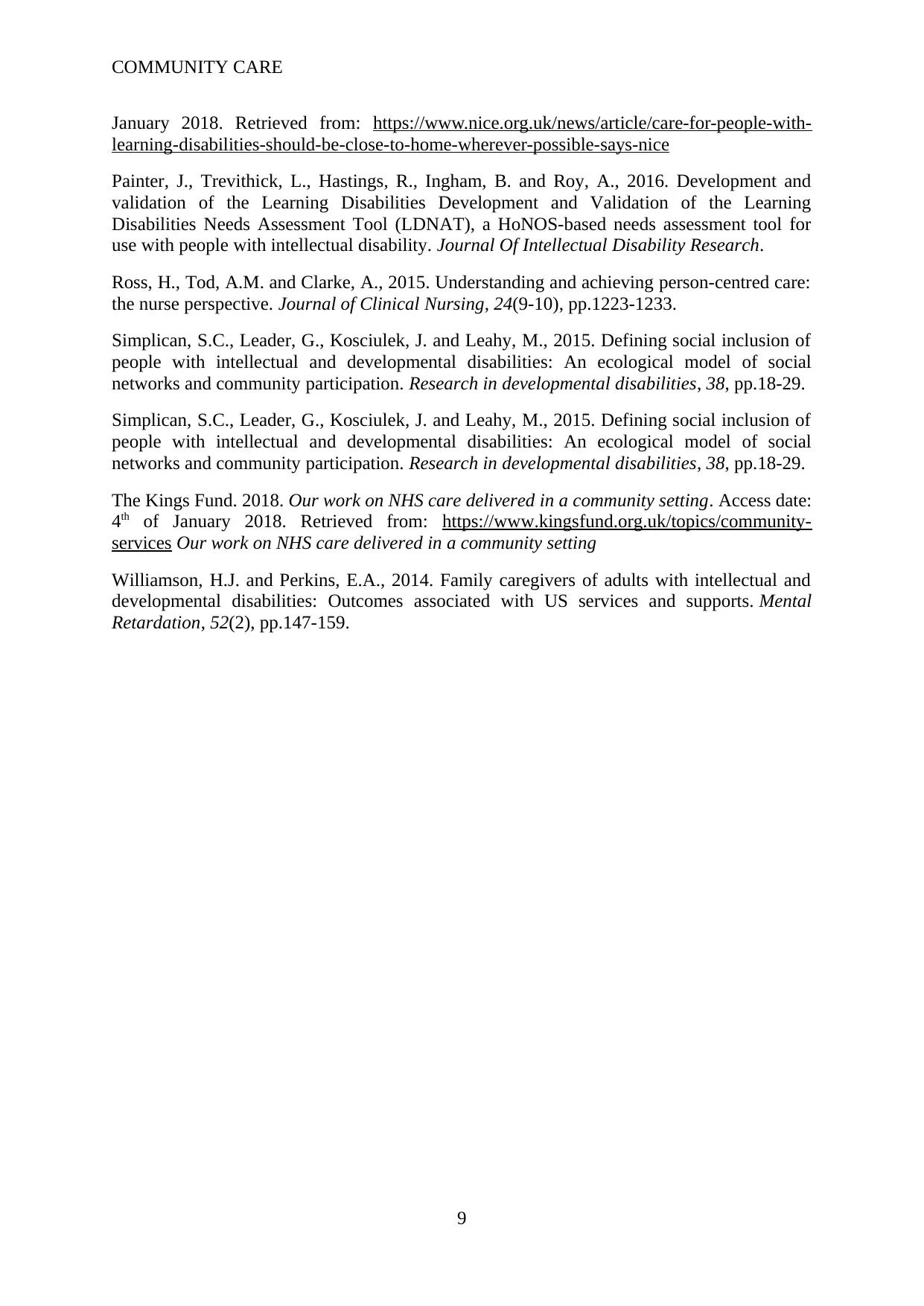
COMMUNITY CARE
January 2018. Retrieved from: https://www.nice.org.uk/news/article/care-for-people-with-
learning-disabilities-should-be-close-to-home-wherever-possible-says-nice
Painter, J., Trevithick, L., Hastings, R., Ingham, B. and Roy, A., 2016. Development and
validation of the Learning Disabilities Development and Validation of the Learning
Disabilities Needs Assessment Tool (LDNAT), a HoNOS-based needs assessment tool for
use with people with intellectual disability. Journal Of Intellectual Disability Research.
Ross, H., Tod, A.M. and Clarke, A., 2015. Understanding and achieving person‐centred care:
the nurse perspective. Journal of Clinical Nursing, 24(9-10), pp.1223-1233.
Simplican, S.C., Leader, G., Kosciulek, J. and Leahy, M., 2015. Defining social inclusion of
people with intellectual and developmental disabilities: An ecological model of social
networks and community participation. Research in developmental disabilities, 38, pp.18-29.
Simplican, S.C., Leader, G., Kosciulek, J. and Leahy, M., 2015. Defining social inclusion of
people with intellectual and developmental disabilities: An ecological model of social
networks and community participation. Research in developmental disabilities, 38, pp.18-29.
The Kings Fund. 2018. Our work on NHS care delivered in a community setting. Access date:
4th of January 2018. Retrieved from: https://www.kingsfund.org.uk/topics/community-
services Our work on NHS care delivered in a community setting
Williamson, H.J. and Perkins, E.A., 2014. Family caregivers of adults with intellectual and
developmental disabilities: Outcomes associated with US services and supports. Mental
Retardation, 52(2), pp.147-159.
9
January 2018. Retrieved from: https://www.nice.org.uk/news/article/care-for-people-with-
learning-disabilities-should-be-close-to-home-wherever-possible-says-nice
Painter, J., Trevithick, L., Hastings, R., Ingham, B. and Roy, A., 2016. Development and
validation of the Learning Disabilities Development and Validation of the Learning
Disabilities Needs Assessment Tool (LDNAT), a HoNOS-based needs assessment tool for
use with people with intellectual disability. Journal Of Intellectual Disability Research.
Ross, H., Tod, A.M. and Clarke, A., 2015. Understanding and achieving person‐centred care:
the nurse perspective. Journal of Clinical Nursing, 24(9-10), pp.1223-1233.
Simplican, S.C., Leader, G., Kosciulek, J. and Leahy, M., 2015. Defining social inclusion of
people with intellectual and developmental disabilities: An ecological model of social
networks and community participation. Research in developmental disabilities, 38, pp.18-29.
Simplican, S.C., Leader, G., Kosciulek, J. and Leahy, M., 2015. Defining social inclusion of
people with intellectual and developmental disabilities: An ecological model of social
networks and community participation. Research in developmental disabilities, 38, pp.18-29.
The Kings Fund. 2018. Our work on NHS care delivered in a community setting. Access date:
4th of January 2018. Retrieved from: https://www.kingsfund.org.uk/topics/community-
services Our work on NHS care delivered in a community setting
Williamson, H.J. and Perkins, E.A., 2014. Family caregivers of adults with intellectual and
developmental disabilities: Outcomes associated with US services and supports. Mental
Retardation, 52(2), pp.147-159.
9
1 out of 10
Related Documents
Your All-in-One AI-Powered Toolkit for Academic Success.
+13062052269
info@desklib.com
Available 24*7 on WhatsApp / Email
![[object Object]](/_next/static/media/star-bottom.7253800d.svg)
Unlock your academic potential
Copyright © 2020–2026 A2Z Services. All Rights Reserved. Developed and managed by ZUCOL.





